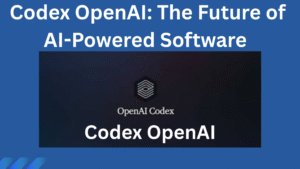Codex OpenAI: The Future of AI-Powered Software Engineering is Here
TL;DR: OpenAI just launched Codex OpenAI, a cloud-based AI coding agent that writes code, fixes bugs, runs tests, and answers developer queries autonomously. Built on the codex-1 model, it’s available for ChatGPT Pro, Team, and Enterprise users. This marks OpenAI’s bold entry into the competitive AI coding space dominated by Anthropic, Google, and startups like Windsurf.
What is Codex OpenAI?
Codex is OpenAI’s latest AI tool designed to revolutionize software development. Unlike traditional coding assistants that work in real-time, Codex operates autonomously in the cloud, completing tasks like:
- Writing and testing code
- Debugging errors
- Answering questions about codebases
- Mimicking organizational coding styles
Powered by the codex-1 model (a variant of OpenAI’s o3 reasoning framework), Codex delivers results in 1-30 minutes, making it ideal for complex projects.
Why Codex Stands Out
1. Autonomous & Cloud-Based
While tools like GitHub Copilot assist developers in real-time, Codex works independently in a virtual environment. It can navigate directories, run commands, and test code without human intervention.
2. Safer and More Transparent
OpenAI claims Codex is trained to explain its actions clearly, addressing the “black box” issue common in AI coding. Its virtual sandbox minimizes risks of corrupting live systems.
3. Enterprise-Grade Adoption
Early adopters include Cisco, Superhuman, and Kodiak. Codex’s ability to adapt to a company’s coding style makes it a favorite for large teams.
Codex vs. Competitors: The AI Coding War Heats Up
OpenAI faces stiff competition in the AI coding space:
- Anthropic’s Sonnet: Preferred by developers for its reliability.
- Google’s Upcoming Tool: Expected to debut at Google I/O next week.
- Startups like Windsurf: OpenAI is reportedly in talks to acquire Windsurf (formerly Codeium) for $3B.
“Competition is clearly there,” admits Srinivas Narayanan, OpenAI’s VP of Engineering.
How to Access Codex
Codex is currently available to:
- ChatGPT Pro subscribers ($20/month)
- Team and Enterprise users
Visit the ChatGPT dashboard to enable Codex during the research preview phase.
FAQs: Answering Your Burning Questions
Q1: How is Codex different from ChatGPT’s existing coding features?
While ChatGPT can write code snippets, Codex operates as a standalone agent. It handles multi-step tasks (e.g., debugging + testing) and works autonomously in a virtual machine.
Q2: Is Codex safe for sensitive projects?
Yes. Codex runs in an isolated cloud environment, reducing risks of data leaks. However, OpenAI advises caution while sharing proprietary code during the preview phase.
Q3: Will Codex replace developers?
Unlikely. Codex aims to automate repetitive tasks (like fixing bugs), freeing developers for creative work. As Josh Tobin of OpenAI says: “Think of ChatGPT as a virtual coworker.”
Q4: What languages does Codex support?
While specifics aren’t public, Codex-1 is optimized for Python, JavaScript, and Java. More languages will be added post-feedback.
Q5: How much does Codex cost?
Pricing isn’t finalized, but it’s included in ChatGPT Pro subscriptions for now. Enterprise plans may involve custom contracts.
The Bigger Picture: OpenAI’s Agentic Future
Codex is part of OpenAI’s push into “agentic AI” – tools that act independently. Other examples include:
- Operator: Automates web browsing tasks.
- Deep Research: Compiles detailed reports via web analysis.
“We’re about to undergo a seismic shift in how developers work,” says Alexander Embiricos of OpenAI.
Final Thoughts
Codex OpenAI is a game-changer, but it’s still early days. With rivals like Google and Anthropic doubling down, the AI coding race is just getting started. Developers should experiment with Codex while keeping an eye on evolving alternatives.
Got feedback or questions? Drop a comment below or tweet @OpenAI.
